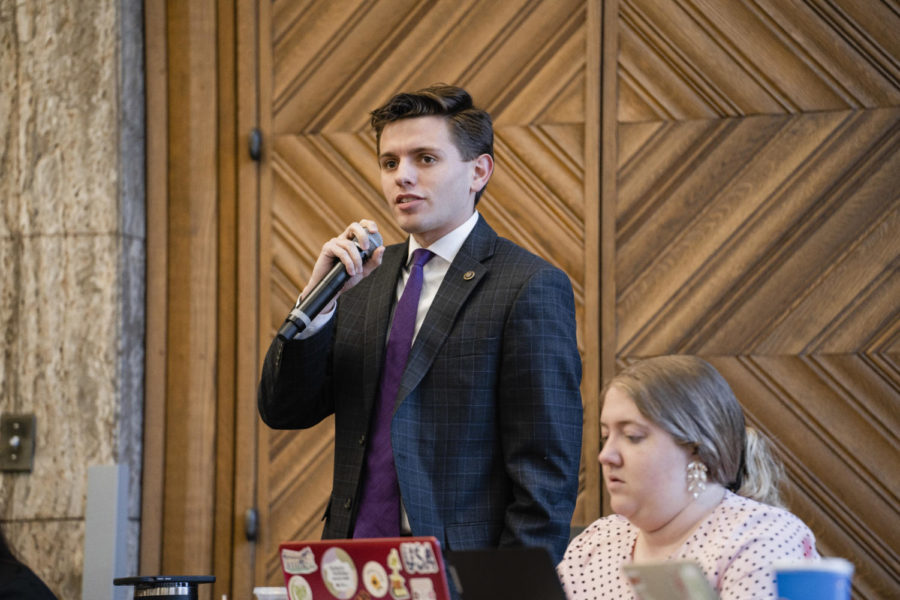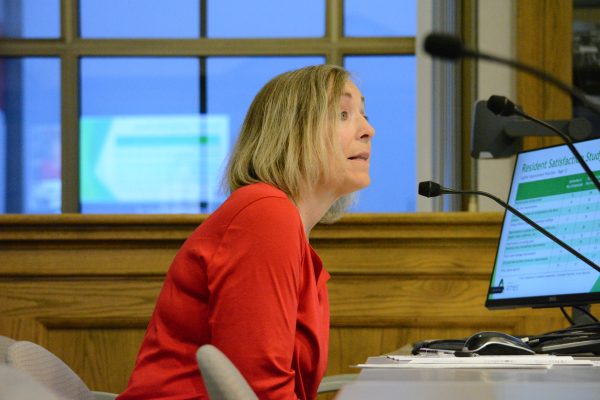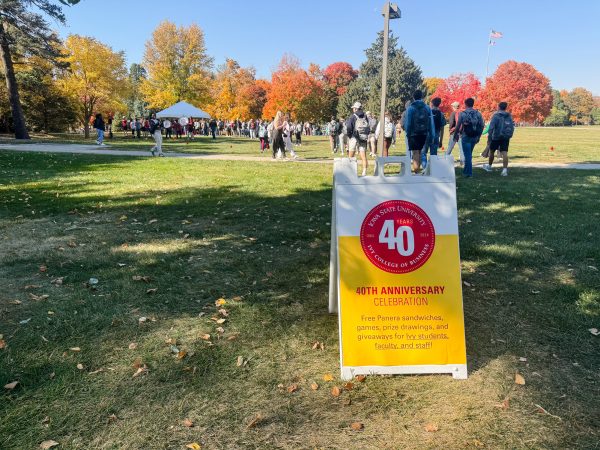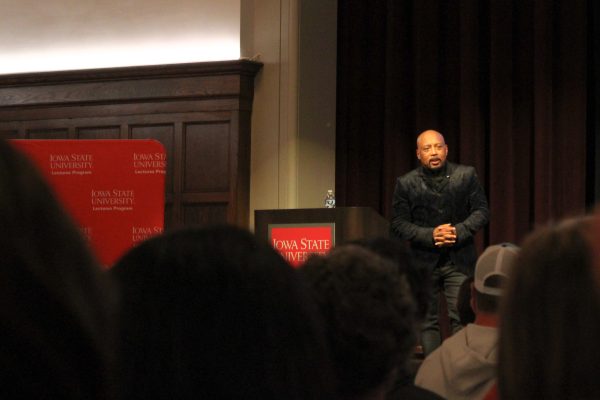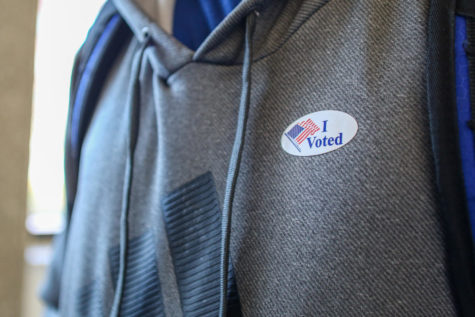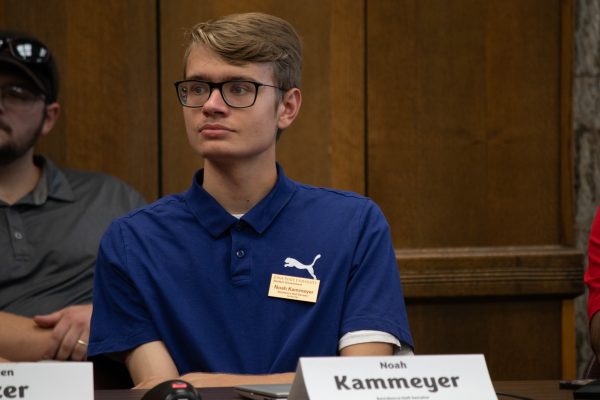Student Government passes bylaw changes, funds men’s rugby
Student Government meeting, Memorial Union, Mar. 22, 2023.
In the last meeting of their session, the senate received the State of the Student Body address, passed a plethora of bills regarding Student Government’s bylaws as well as funding a competition for the Rugby Club (Men) and passing ASSET recommendations.
State of Student Body
President of Student Government Jacob Ludwig, a senior double majoring in economics and political science, gave his final State of the Student Body address, highlighting some of the projects Student Government completed this year while focusing on the concept of legacy.
“First, we have to ask, ‘What is a legacy?’” Ludwig said. “It is something passed on or left behind, and for us, our legacy is going to be the things that we did and the tasks that we left on.”
Ludwig said most of the senators present might have a project they wanted to start that they were unable to finish, but they should not let that define their legacy.
“I know that personally, Vice President Ahlrichs and myself would have liked to see more work done down at the state capitol and in the area of international students of your services,” Ludwig said.
Ludwig then went on to detail how Student Government has made a lasting impression on the campus this year.
“With one-third of students suffering from food insecurity, we took major steps this year to ensure that they can have access to the support they need,” Ludwig said. “Over the next five years, we will be investing $350,000 in the SHOP that will help them purchase supplies, including international food and hygiene products.”
Ludwig also highlighted projects like investing in student journalism, funding the Jack Trice Character Award fellowship, the menstrual dispensers now available at gender-neutral restrooms across campus, the Health and Wellness Committee’s smart-tailgate initiative, the Cyclone Support website, sustainability efforts from the Sustainability Committee, such as getting new solar trash and recycling compactors funded and CyRide’s new electric bus fleet.
“Because of the work we’ve done, students will be empowered to greater food insecurity, accessible health resources, newly empowered journalism, larger scholarships and expanded sustainability programs, and I think that is a legacy that everyone should be proud of,” Ludwig said.
Stipends for Cabinet Members
The senate failed to pass a bill that would provide members of the president’s appointed cabinet with a stipend for their work with a vote of 4-17-2, with many senators expressing their dissent for the bill.
The bill would have seen a $500 stipend dispersed among the directors of government relations, information technology (IT), student diversity, sustainability, academic affairs, outreach, international student experience, health & wellness, student services, marketing, affordability, the senior director of communications, the non-profit coordinator and the ex-officio to the Ames City Council.
Vice-President of Student Government Jaden Ahlrichs, a senior in global resource systems, advocated for the bill, saying he was made uncomfortable by how often he would say to members of the cabinet, “Man, I wish we were paying you.”
Ahlrichs said he reached out to the presidents and vice presidents of both the University of Iowa and the University of Northern Iowa to analyze their model of compensation for their position equivalent to Iowa State’s cabinet. Ahlrichs said he also reached out to all the schools in the Big 12 and found out, from those who responded, that they also compensate their equivalent of cabinet members.
Liberal Arts and Sciences Senator Meredith Mays, a senior majoring in communication studies, said she was uncomfortable with how the bill did not list any requirements for any of the cabinet positions, aside from requiring them to have been in their position for at least 30 days.
“Who’s to say that next year, not to judge whoever is picked for cabinet or anything like that, […] but who’s to say that the director of health and wellness next year is really lazy and doesn’t want to do anything?” Mays asked. “I don’t feel comfortable giving them a stipend when we’ve had directors in the past do so much more.”
Mays added she does not like the idea of taking funds that could be disbursed to students and putting them back into Student Government.
“I don’t think there’s a way we could judge who deserves money and who doesn’t within Student Government unless they have those delineated rules that say ‘you’re giving this much time that’s almost equivalent to a part-time or full-time job every week to this organization,’” Mays said.
Interfraternity Council Senator Brandon Kamstra, a senior in kinesiology and health, said he was in favor of the bill after witnessing what stipends can do to revitalize fraternity participation.
“I don’t know if I agree with the amount or the accountability aspect of it because I think those are great issues that have been brought up during tonight’s discussion,” Kamstra said. “I’ve seen this as a great tool for incentivizing positions within fraternities to […] be run for. As an organization that has decreasing membership, decreasing interest and increasing knowledge on campus, I think this would be a great recruitment tool, though, again, I don’t know if I agree on the amount.”
Kamstra added that he does not know if the stipend would have been enough to stop a cabinet member from getting a part-time job, but that it would be enough to encourage people to apply for the position.
Finance Director Kit Clayburn, a senior majoring in animal ecology, spoke to the senate both during debate and in open forum advocating against the passage of the bill.
“ISU Student Government is unlike others,” Clayburn said. “Our budget is mostly for students outside of our organization, and we’re the only […] school in the Big 12 to allocate this much money to student organizations.”
Clayburn said if Student Government begins to fund their own positions, other student organizations may follow suit.
“What is stopping other partner or sponsor organizations to not request similar stipends to pay for executive members who have done wonders for this campus?” Clayburn asked. “Cabinet positions are volunteer positions, not ones that require payment to function.”
ASSET Funding
Student Government, as a funder of the Analysis of Social Services Evaluation Team (ASSET)– a partnership between the City of Ames, United Way of Story County, Story County, Iowa State University Student Government and Central Iowa Community Services– is required to establish funding priorities within the senate’s third session each year to allow ASSET recipients time to plan their requests.
The senate unanimously passed their list of priorities which include:
- Services addressing basic needs for students including:
- Rent or utility assistance.
- Hygiene and clothing.
- Emergency shelter services.
- Mental health services such as:
- Outpatient mental health services.
- Crisis intervention programs.
- Public education and awareness programs.
- Assault care services including:
- Sexual abuse support.
- Domestic abuse support.
- Public education and awareness programs.
- Substance abuse prevention and treatment including:
- Rehabilitation programs focusing on substance abuse treatment.
- Outreach programs discouraging substance use.
- Childcare services including:
- Infant and toddler-age childcare.
- School-age childcare.
- Diversity and inclusion programs including:
- Programs empowering traditionally discriminated-against communities and peoples such as those of disability status, gender, sexual orientation, race and ethnicity.
- Social and family development programs.
- Legal aid services not provided by Student Legal Services such as:
- Civil cases.
- Probation services.
“Historically, the sections have been tiered in priority, but we also then went through and had the individual items beneath them be in order of priority,” said Residence Hall Senator Quinn Margrett, a freshman in business economics. “That kind of helps us when we’re making decisions not have to arbitrarily pick between multiple things that are in the same category, so technically the same priority.”
Committee Overhaul Bill
The senate passed a bill titled the Committee Overhaul Bill, which according to the bill makes “substantial changes to the committees […] necessary to improve their operation” due to “scattered and lacking” rules and bylaws governing their structure.
The changes to the committees include:
- Recognizing the Diversity, Equity and Inclusion Committee as a senate committee as opposed to a committee under their director.
- Requiring the director of affordability to sit on the finance committee.
- Adding the director of IT to the Public Relations Committee.
- Adding seats for supreme court justices to every committee except the finance and rules committees.
- Making the director of Student Services the chair of the Student Initiatives Committee.
- Adding Student Government’s ASSET liaisons and non-profit coordinator to the Student Affairs Committee.
- Adding the Health and Wellness Committee to the Student Government bylaws.
- Adding legislative ambassadors to the bylaws.
- Requiring the confirmation for the director of outreach to be confirmed by the senate.
The senate also made changes to its bylaws to clarify how chief officers are compensated. Changes include adding “(most majors) following how chief officers will be compensated in regard to their scholarship for: the president of Student Government, who is offered a full-tuition scholarship; the finance director, who is offered a scholarship equivalent to three-fourths tuition; the vice-president, who is offered a scholarship equivalent to three-fourths tuition; the speaker of the senate, who is offered a scholarship equivalent to half of their tuition.”
The change added a bylaw that would add either a summer or winter semester scholarship for the president and finance director equal to four earned credit hours for most majors.
Student Fee
The senate passed a bylaw which, according to senate documents, aims to further include the legislative branch in determining Student Government’s student fee structure.
The bill states that the finance director will not propose an initial figure for the student activity fee to the senate by the first senate meeting of the second session.
If the figure is equal to the current student fee, the request will be finalized. The new bylaw provides the senate with the means of amending the fee request by introducing a finance bill on the floor, which will require a two-thirds vote of seated senators to pass.
“Talking to President Ludwig, it was his feeling that the current way we request our fee from the university’s special fee and tuition committee was kind of lacking,” said Off-Campus Senator Andrew Brueck, a senior in political science and vice-speaker of the senate. “It effectively boils down to what he and the finance director want, and while they’re certainly smart, capable people, we don’t really operate on the whims of just two people in this organization, typically.”
Floor Elections
The senate passed a bill detailing a process for floor-based elections.
Whenever a bill regarding a floor-based election is before the senate, the election will go through three stages: first, the questioning stage, which allots each nominee a five-minute speaking privilege, and senators will have two five-minute speaking privileges in which they can only ask one question per speaking privilege; second the debate stage, where the nominees will be requested to leave the room to allow senators to debate in their absence with two five-minute speaking privileges per senator; and finally the clarification state, where nominees will re-enter the room, and senators will again gain two five-minute speaking privileges.
“So essentially to explain this bill: any sort of bill that has what we call the floor base election, so think elections are speaker, vice-speaker– but also every other kind of bill that has a nomination– […] we don’t really have any language in our bylaws about this process; it’s just kind of a bit of a free-for-all,” said College of Engineering Senator Max Kueller, a senior in software engineering. “This whole process aims to kind of address that.”
Green initiative
The senate moved to change the bylaw requirements for green initiative projects to better align with the project requirements listed on the green initiatives page on Student Government’s website.
According to their website, the Green Initiatives Fund is a fund for student-led organizations around Iowa State and Ames. Groups can apply to receive money for their projects, events and initiatives that promote environmental, economic or social sustainability.
“Basically, an issue with the green initiative on bylaws was that they did not at all match the green initiative fund form,” said Off-Campus Senator Katherine Engelken, a senior majoring in animal ecology. “So, I changed the bylaws to be more similar to the forum, and I also redid the form to be more similar to the bylaws I wrote.”
External Matters
The senate also moved to fund the Rugby Club (Men) $834.60 so they can cover fees to compete in their final four competition on April 15.
Andrew Guinn, a senior majoring in accounting and the club’s treasurer, said the competition will take place in Houston.
“[Making the semi-finals is] something we didn’t budget for during like the sports club budgeting meetings, so we’re […] requesting the money to be able to […] help us get down there,” Guinn said.
The senate also moved to renew its contract with the Iowa State Committee on Lectures early. The contract between Student Government and the committee is a five-year contract, that endows the committee with $150,000 from Student Government every fiscal year. It also requires the committee to present to Student Government each year with a report outlining programs and activities that happen both throughout the year and prospectively.
Your donation will support the student journalists of the Iowa State Daily. Your contribution will allow us to purchase equipment, send our student journalists to conferences and off-set their cost of living so they can continue to do best-in-the-nation work at the Iowa State Daily.


